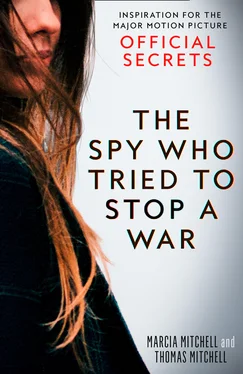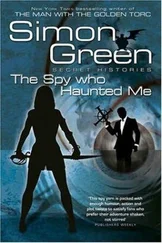On Katharine’s screen was a blatant invitation to a conspiracy. The United States was mounting an illegal intelligence operation against the UN Security Council member nations – and their representatives – that would cast the deciding vote on a resolution for war against Iraq. At the moment, the undecided were resisting US pressure for an ‘aye’ on launching a pre-emptive strike.
The purpose of the operation was explained – to collect ‘the whole gamut of information that could give US policymakers an edge in obtaining results favorable to US goals’. Clearly, the principal goal was war. Sooner rather than later. Called for was listening in on not only office communications, but also ‘domestic’, private conversations.
Britain was asked to join ‘a surge effort … against UNSC members Angola, Cameroon, Chile, Bulgaria and Guinea’, with special attention on Pakistan. Other UN delegations not sitting on the Security Council at the moment were also good targets because they could ‘contribute related perspectives insights whatever.’ The message, sent by the NSA’s Frank Koza, recognized that ‘we can’t afford to ignore this possible source’.
As for timing, Koza wrote, ‘this effort will probably peak (at least for this specific focus) in the middle of next week, following the SecState’s presentation to the UNSC’. It was important to know how the ‘swing voters’ reacted to Colin Powell’s weapons of mass destruction (WMD) pitch to the Security Council and, it seems, to collect secrets that could manipulate those reactions, ensuring that they would be ‘favorable to US goals’.
‘I sat there, mesmerized, appalled by the fact that the public rhetoric of George Bush and Tony Blair, especially Tony Blair at that time, led us to believe that all efforts were being directed toward securing a diplomatic resolution to the matter of Iraq, not toward an inevitable war. They talked of other options: Saddam Hussein being forced to give up his WMD, or having to leave Iraq. It seemed so hypocritical that they were saying this on the one hand in public, and behind everyone’s back, they were desperately trying to seek a yes-vote to the second resolution to justify a war that they obviously wanted. They were willing to use any means to get what they wanted.
‘It seemed to me, as I sat there thinking, that if people knew what really was going on, they would understand that the intent all along was war, not disarmament. I asked myself: How could anybody even hope for a chance of resolving the issue peacefully when the motives of the US administration were so apparent, so blatant? Besides, I didn’t think that the job of the intelligence services was to manipulate, to politicize intelligence. I don’t believe you should tailor intelligence to a political agenda. I was angry – angry about their trying to manipulate the vote in the Security Council.
‘I knew there were others like me at GCHQ who were worried about this rush to war, who had serious questions in mind.’
By a strange coincidence, a memorandum had been circulated to staff exactly one week earlier. It read, ‘I know from the questions you have asked … that some of you have concerns about the legal or ethical basis of war against Iraq – if and when it happens – and GCHQ’s part in it.’ ‘Well,’ assured the senior officer responsible for the memorandum, ‘there is no question of any member of GCHQ being asked to do anything – at this or any other time – which is not lawful.’
It is likely that the author of the memorandum to staff believed what he wrote so convincingly. Further, he assured, ‘British troops do not go into action unless the Attorney General has advised the Prime Minister that their action is lawful.’ The directive also quoted the prime minister’s remarks from two weeks earlier, when he promised he would never commit British troops to a war he thought was ‘wrong or unnecessary’. Besides, the government ‘has shown its commitment to trying to resolve this difficult situation by agreement with the international community, through the United Nations’.
Through the United Nations. By doing what the Koza message asked? Creating a false coalition? Would the United Kingdom join the United States in this apparent hypocrisy?
That night, after work, Katharine did not take the bus but instead walked several miles into town through the dark and the cold, wanting to be alone with her thoughts. One in particular, she says, ‘was already running around in my head, that this was explosive stuff’. She reached the café shaking with a combination of cold and rattled nerves, pulled off her heavy sweater, and folded into a chair to watch her husband finish his chores before closing. Nothing was said, not a word about the Koza message. He could not know, not at this point. It was a matter she would have to decide for herself, unless, of course, she had already decided. She thinks, perhaps, she had.
‘To be honest, I must admit that the decision to leak the e-mail was instantly in my mind as soon as I read it, not finally made, but certainly in my mind. It was there because of the nature of the message and the impact on me.
‘At the time, all I could think about was that I knew they were trying really hard to legitimize an invasion, and they were willing to use this new intelligence to coerce, perhaps blackmail delegates, so they could tell the world they had achieved a consensus for war. I felt so strongly, and I knew there was so much public anxiety and anger about a pre-emptive strike, about rushing into war, that I didn’t really think about my own personal circumstances at that stage.’
It is along about here in Katharine’s story that her critics howl. What did she think the NSA and GCHQ were doing? Knitting sweaters for poor children in third world countries? She was in the spy business, for God’s sake, they will say. And what was afoot in the business at the moment was a spy operation. Surreptitiously, clandestinely collecting information. The United States and United Kingdom were simply trying to acquire information about the positions of the various target countries. Nothing new – in fact, so old hat as to be boring. So what, they ask, was her problem about a bit of high-stakes eavesdropping at the United Nations?
‘Yes, it was eavesdropping,’ Katharine agrees, ‘and that’s what I did for a living.’ But what she did in the normal course of her work was something quite different, as she sees it, from what GCHQ was being asked to do by the NSA. ‘This request was far more than attempting to collect information on negotiating patterns, on likely responses to draft proposals.’ It was how the information was to be used. Here Katharine and her colleagues were being asked to help manipulate those patterns and responses, to legalize what otherwise might well be an illegal war. Much later, in the spring of 2005, what was going on was described to the public as tailoring intelligence to fit policy.[2]
‘You’re being asked to participate in an illegal process with the ultimate aim of achieving an invasion in violation of international law,’ Katharine says. An illegal process with the imprimatur of a bogeyman on the loose.
Ultimately, Katharine believed that if the Koza message was released to the public, people would see clearly that, despite official government pronouncements about seeking a diplomatic resolution to the Iraq problem, behind-the-scenes unofficial government was in pursuit of quite a different solution. And that solution would allow the United States and United Kingdom governments to claim that a unified United Nations believed Iraq was in contravention of Security Council resolutions and was an imminent threat to world peace. War, then, would be both legal and necessary.
Timing was a significant issue.
Читать дальше












